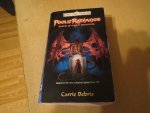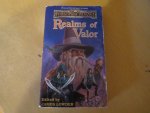#025 Pool of Radiance: Ruins of Myth Drannor by Carrie Bebris (Heroes of Phlan 4)
Read 13/11/19 to 15/11/19

Book 4- obviously it's just more of the same, another piece of merchandising for a poorly conceived and rendered (TSR/Wotc- so, probably) computer game. But here's the thing- I bloody loved it.
I wasn't expecting to, at first I even tried a little active dislike to see if I could make it fit, it didn't, and as I read on I got more and more in to it. Confession time, I was on page 120 when I awoke this morning, the rest of the book (just short of 200 pages) well that accounts for a chunk of my afternoon and evening.
There's a pool, sorry Pool- this one is in Myth Drannor (and with tributaries popping up (again) in other cities around the Moonsea), the Dragon Cult (yay!) are the bad guys- the pools, sorry- Pools, are fuelling extensive (possibly) Dracolich production. The bad guys are Kya Mordrayn (Dragon Cult Wizard with massively clawed hand/arm- nice, dressed in slutty-slut-slut with added wings- double nice!) and Pelendium… no, that's not it- Perpendicular, nope- Palindrome, NO! Pelendralaar- lar-lar-lah-la-la-la-lah, la-la-la-lah- hey Jude, the Dracolich. We don't really see either of this odd couple for a vast majority of the book- hints and reminders, the odd image or snippet but nothing much else. And specifically not their bent and broken machinations, ad hoc evil puppetry, or other singer/songwriter style talents of the usual fleabag villains that have populated this series.
So, in the finale- when the bad guys get to do their do- then I'm gripped moment-to-moment, don't get me wrong we all know how this is going to end, it's the manner and the register of the victory that makes the reader's parting moments either hellishly sweeter, or else a scowling retreat punctuated by "Gah!" and "Bah!" (other noises are available- shop around).
That however isn't the best bit- the best bit is it sounds, smells and even feels like an adventure- by which I mean a bunch of adventurers ham-fisting it around (at times) a dungeon style complex, they get better- they learn, they become tactically astute. They get on- they don't get on, the red shirt Emmeric (from memory) gets fried. Our guy, scratch that- gal, is Kestrel and she's our eyes and ears to this rip-roaring adventure; likewise her change of heart is almost (dare I say it) believable, it's the same epiphany I've been trying to achieve as a DM- to make the Players bloody care about the adventure!
The other members of the adventuring team are also good, we don't invade their heads to hear what they are thinking, but we eventually get to like them all the same.
The level progression works(-ish), even the myriad magic item gew-gaws smell of AD&D and the edition beyond, it's like the author deliberately set out to write a book about a great big jolly old game of D&D.
Last bit, there are silly things- the daft stuff that's inherent in all of these books, but it is much easier to forgive- because while these guys may be saving Myth Drannor/the cities of the Moonsea/the World (etc.) what they're actually doing is slogging their way through a semi-sensible (and sentient) dungeon, and we stick with them all the way. No grandstanding, just the story- front and centre, all the way to the bloody (and heroic) end.
I also loved the various Elven spirits, there are chunks of this novel that I am going to be taking back to my gaming table.
READ!


